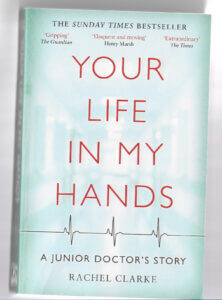 A Junior Doctors Story
A Junior Doctors Story
Title: Your Life in My Hands. A Junior Doctor’s Story. Rachel Clarke. Published by John Blake Publishing. 2017
Your Life in My Hands Book Review is one of those books that ought to be read if you have no clear ideas on what the NHS is about.
One of my passions is to read autobiographies and autobiographic novels to learn more about life and our history. This is never more by reflecting and learning from the observations of others.
A book at our garden centre
Having worked for the NHS myself for over 30 years in various forms, I recognise that Dr Rachel Clarke comes with two pedigrees. She did not go into medicine first but worked as a journalist in her first career. Secondly, she became an activist at a time when the subject of medical care needed a strong voice.
This book found its way into my hands when visiting a gardening centre. It has good reviews but that alone does not mean that it is good. It just happens to be good because of the open honesty that seeps out of its 281 readable pages. The remaining few pages are relevant as references. Rachel quotes sources. As a journalist and scientist she would do this as part of her training so you know how important these are. If you were around and alive to the efforts of Mr Jeremy Hunt during a dispute that took doctors to the end of their tether, you will recall their first ever strike. Given that I worked in the private sector, having retired from the NHS, I relied on friends to keep me abreast during Rachel’s time. Now for the first time I could feel the pain and anguish that this women and her colleagues were faced with. ‘Junior’ of course is a term that has nothing to do with age or lack of capability. It is just that doctors in this case had not reached their higher status as consultants and Specialists.
A time line with a difference
Divided into 17 sectional chapters, including an epilogue, and I love an epilogue, she choses recognisable themes. Each chapter takes on its own shape but the chronology bounces around. I liked the one word title for each section which expounds a pithy edge to the intended storyline the reader is about to encounter. That title often takes you in a different direction. Now some may not like this, but for the reader the challenge is to see how a reflective person draws not on one linear story, but includes and imports pastiches and anecdotes from her doctor family to colleagues and her intense days when dealing with journalism and chaos.
Why should women have to struggle?

Dr Rachel Clarke
The fact that this warm person reminds us that women suffer far more degradation at the hands of men, will entreat the audience as well as shock others.
If men fail to recognise her message then they will probably not even start to read this book. She touches on the crisis of Mid-Staffs, a bit close to home as I lived in the same county. The structure and ethos within the health service at that time was to gain Government credit. So much were efforts to achieve high hospital status that many hospitals eskewed the worst practice; and went unreported. Rachel leaves us in no doubt, as we clinicians were aware, Mid-Staffs was but one example, but they were ‘royally’ caught out. There were many more hospitals cutting corners intending to adorn special status. This is a painful book to read because it brings out emotions. Our UK established NHS is not what we think it is. But for the stalwarts that work the corridors and wards, the outpatients and A&E departments, the NHS would now be shattered. The people are good, they work hard and long hours. But recognising that money is spend badly perhaps does not come out as much as it should. Rachel feels more money should help staffing and in that she is right. She does not touch on how money is squandered and diverted which means the thirst engendered by a bottomless pit will never be sated.
Whistleblowing
The idea of Whistleblowing has been seen to have a retrograde effect for NHS workers. Search and ye will find many examples. History of medicine shows this from the days of the Bristol Babies to the crises led by opportunists such as the breast surgeon, Ian Patterson when management knew but failed to listen to medical staff. Rachel knew her own career was at risk. She had a child and a husband and had to balance the consequences of speaking out. Her story reeks of undertones of misfortune at the hands of both government and senior managers.
You may revere the NHS and we all should appreciate its goals, but Dr Clarke’s analysis reveals that the NHS is not only crumbling but the long term effects of being a political football has led it to the crisis we struggle with today. She points out how politicians cannot learn from the advice they are given and in this she has made a strong case for a major review.
If you really want to know what is happening then this is an important educational book for all to read, even more so now that we are gripped with confusion of the effects of Covid-19 on our island society. We need to learn from the lessons told by able authors such as Rachel Clarke.
Thanks for reading ‘Your Life in My Hands Book’ Review by David R Tollafield
David is a retired Consultant Podiatric Surgeon and now independent author and foot health journalist since 2017. website:consultingfootpain.co.uk
Published by Busypencilcase Reflective Communications (Est. 2015)

September 2020

Recent Comments